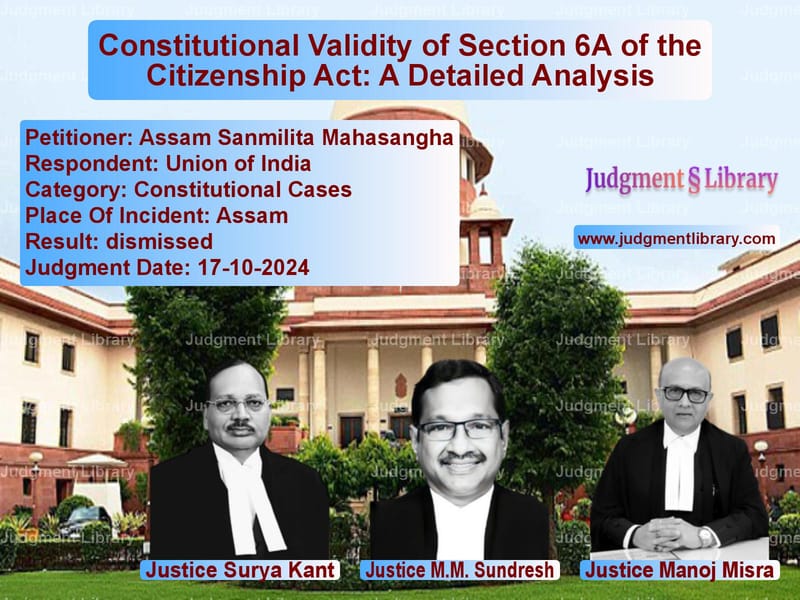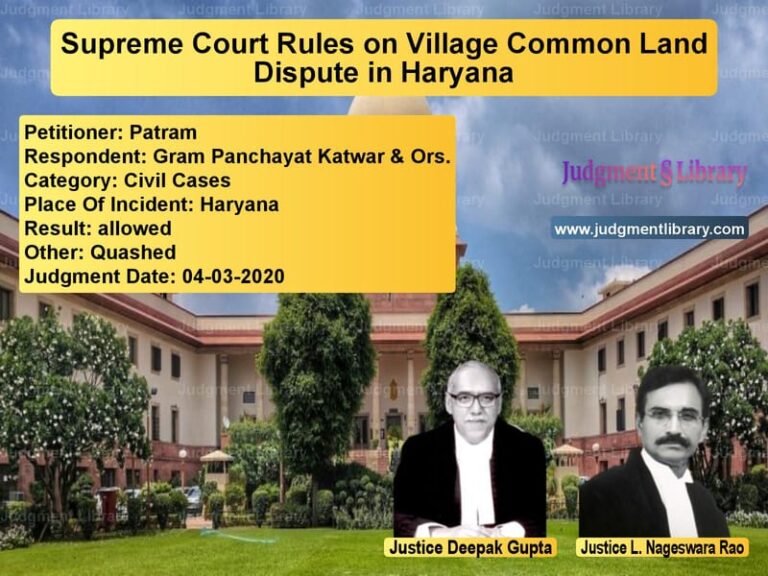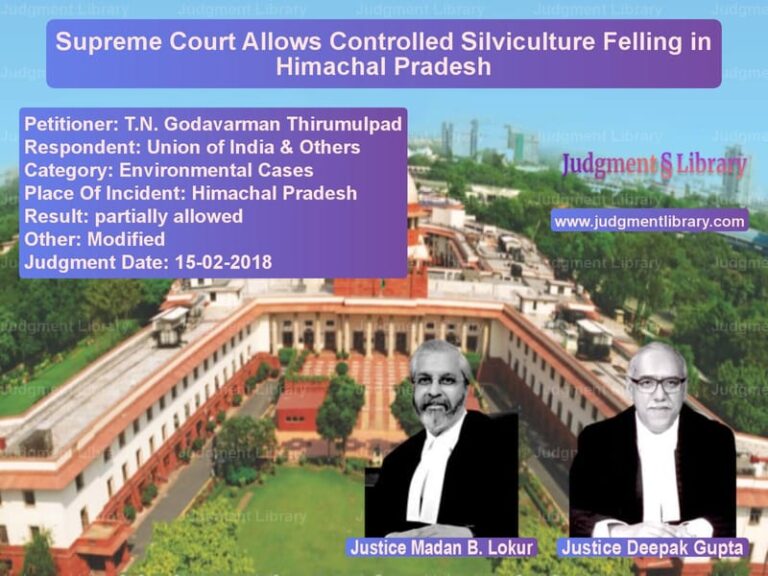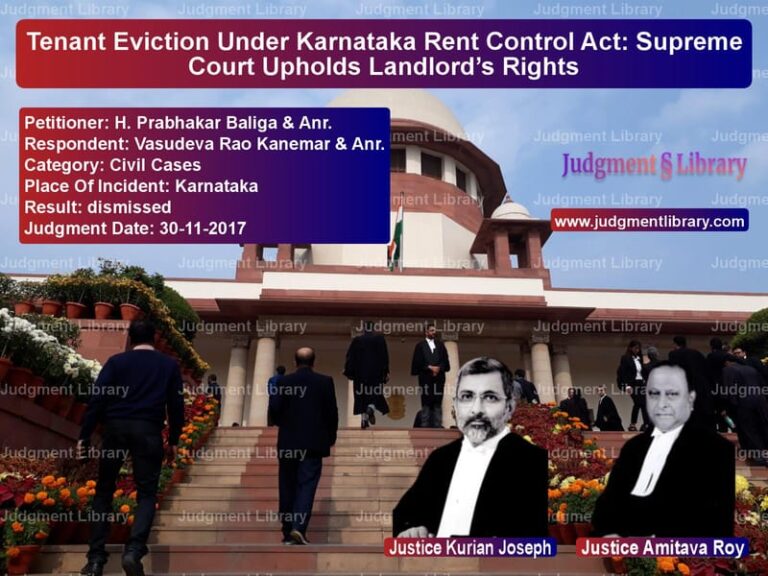Constitutional Validity of Section 6A of the Citizenship Act: A Detailed Analysis
The constitutional validity of Section 6A of the Citizenship Act, 1955, has been a subject of extensive judicial scrutiny, particularly regarding its implications on Articles 14, 21, 29, 326, and 355 of the Indian Constitution. This blog post provides a comprehensive analysis of the recent Supreme Court judgment that examined whether Section 6A stands the test of constitutionality.
Section 6A was incorporated into the Citizenship Act as part of the Assam Accord of 1985. The provision granted Indian citizenship to immigrants who entered Assam before March 25, 1971. However, this special classification was challenged for allegedly violating fundamental rights under the Constitution.
Petitioners’ Arguments
The petitioners contended that:
- Section 6A discriminates against Assam by treating it differently from other states where illegal immigration has also occurred, thereby violating Article 14.
- The demographic changes caused by the influx of immigrants infringe upon the cultural and linguistic identity of indigenous Assamese people, violating Article 29.
- Mass immigration has resulted in economic and social marginalization, constituting a breach of the right to life under Article 21.
- Illegal immigrants have been included in electoral rolls, affecting the voting rights of Assamese citizens, thereby violating Article 326.
- By allowing large-scale immigration, the Central Government has failed to protect Assam from ‘external aggression’ and ‘internal disturbance,’ contravening Article 355.
Respondents’ Arguments
The respondents countered that:
- Section 6A was enacted as a political settlement to address the long-standing concerns of Assam while balancing humanitarian obligations towards refugees.
- The classification under Section 6A is reasonable and serves a legitimate state objective, making it compliant with Article 14.
- There is no direct evidence to establish that Section 6A has eroded Assamese culture to the extent of violating Article 29.
- Illegal migration cannot be equated with ‘external aggression’ under Article 355, as the migration in question was distress-driven.
- Petitioners have failed to demonstrate any actionable violation of fundamental rights.
Key Judicial Findings
Article 14: Equality Before Law
The Court ruled that Section 6A does not violate Article 14. It held that the classification between pre-1971 immigrants in Assam and those in other states is based on historical and geographical considerations. The provision emerged from a political accord and, therefore, does not constitute ‘hostility’ against Assam.
Article 29: Protection of Culture
The Court found that while demographic changes have been significant, there was insufficient evidence to prove that Section 6A alone was responsible for any cultural erosion. The judgment stated:
“The petitioners have failed to demonstrate that the loss of cultural identity is directly attributable to Section 6A.”
Article 21: Right to Life
Regarding claims of economic and social marginalization, the Court held that while these concerns are valid, they do not establish a violation of Article 21. The state has an obligation to implement welfare measures, but Section 6A itself does not deprive Assamese citizens of their rights.
Article 326: Voting Rights
The Court rejected claims that Section 6A affects voting rights under Article 326. It noted that once immigrants obtain citizenship through legal means, they enjoy equal rights, including the right to vote.
Article 355: Duty to Protect States
The Court ruled that Article 355 does not provide a standalone basis to challenge legislation. It clarified that illegal migration does not equate to ‘external aggression’ unless there is a clear intention to subvert state sovereignty.
Final Verdict
The Supreme Court upheld the constitutional validity of Section 6A, concluding:
- Immigrants who entered Assam before January 1, 1966, will continue to be deemed citizens.
- Immigrants who arrived between January 1, 1966, and March 25, 1971, and met the legal criteria will retain their citizenship.
- All immigrants arriving after March 25, 1971, will be considered illegal and subject to existing deportation laws.
The Court directed the government to enhance immigration monitoring and ensure timely detection and deportation of illegal immigrants. The judgment reinforces the balance between national security and humanitarian considerations in citizenship laws.
Petitioner Name: Assam Sanmilita Mahasangha.Respondent Name: Union of India.Judgment By: Justice Surya Kant, Justice M.M. Sundresh, Justice Manoj Misra.Place Of Incident: Assam.Judgment Date: 17-10-2024.
Don’t miss out on the full details! Download the complete judgment in PDF format below and gain valuable insights instantly!
Download Judgment: assam-sanmilita-maha-vs-union-of-india-supreme-court-of-india-judgment-dated-17-10-2024.pdf
Directly Download Judgment: Directly download this Judgment
See all petitions in Fundamental Rights
See all petitions in Constitution Interpretation
See all petitions in Legislative Powers
See all petitions in Public Interest Litigation
See all petitions in Judgment by Surya Kant
See all petitions in Judgment by M.M. Sundresh
See all petitions in Judgment by Manoj Misra
See all petitions in dismissed
See all petitions in supreme court of India judgments October 2024
See all petitions in 2024 judgments
See all posts in Constitutional Cases Category
See all allowed petitions in Constitutional Cases Category
See all Dismissed petitions in Constitutional Cases Category
See all partially allowed petitions in Constitutional Cases Category







